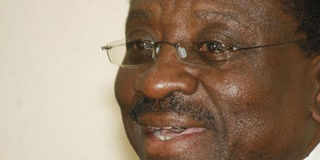ODM disowns efforts to challenge ICC cases

ODM's James Orengo. The party has disowned the government’s efforts to challenge the cases facing the Ocampo Six at the International Criminal Court March 23, 2011. FILE
The Orange Democratic Movement has disowned the government’s efforts to challenge the cases facing the Ocampo Six at the International Criminal Court, jeopardising efforts to save the suspects.
Lands minister James Orengo was categorical Wednesday that the Orange party would not support the move to file an application at the ICC challenging the admissibility of the cases on grounds that neither Prime Minister Raila Odinga nor its representatives in the cabinet sub committee on ICC were consulted.
“All the people who attended the meeting that arrived at that decision were from PNU. Not a single person from ODM was invited so this decision is self serving, it is not a decision of the coalition government,” Mr Orengo said.
The position was re-affirmed by the ODM Parliamentary Group, which termed Attorney General Amos Wako’s move giving London based lawyer Sir Geoffrey Nice the go-ahead to challenge the cases at ICC as “dead, a waste of public resources and doomed to fail".
“Why is the government wasting precious taxpayers’ money to initiate a process that’s dead from the beginning?” the group’s secretary Ababu Namwamba posed at a press conference at Parliament Buildings last evening.
“As one half of the government, we certainly don’t feel that this letter represents 50 per cent share in government. This move is dead, a waste of public resources and is setting Kenya on the path of more ridicule,” said the Budalang’i MP.
Kenya is seeking to challenge the admissibility of the cases by the ICC and its jurisdiction over the crimes committed on grounds that it is in the process of setting up a local mechanism to try the cases.
ODM’s argument is based on an opinion on the Kenyan situation by Sir Nice and Rodney Dixon, the other lawyer engaged by Kenya, outlining the scenarios applicable.
The lawyers conclude in the letter that “statistical assessment of prospects (of the success of filing the case) will be difficult in the extreme".
Mr Namwamba said Kenya could only succeed in challenging the case if it had established proper mechanisms to investigate the crimes committed during the post-election chaos.
He charged that the police are suspects in the crimes committed and would not investigate themselves, and there would therefore need to have assistance from the United States Federal Bureau of Investigations and Britain’s Scotland Yard.
Mr Orengo on his part maintained that the ODM wing of the coalition was not involved in deliberations leading to the decision.
“I wish to point out to you that it is important that legal advice should be sought and given in the appropriate manner. There is a coalition government in Kenya established under the National Accord and Reconciliation Act and the Constitution of Kenya,” he protested.
“It would be inappropriate for any section of Government to make unilateral decisions on this weighty matter,” he added and demanded that the sub committee be convened to review the decision.
He, however, maintained that ODM would not “bother” to challenge the government’s move at the ICC because it stood no chance of success.
“We don’t even need to block it because it is incompetent, vexatious and frivolous,” he stated.
Mr Orengo maintained that the application to challenge the cases on grounds of admissibility was doomed to fail because it only addressed the plight of the six suspects and not the 1,133 Kenyans who lost their lives in the violence.
The government’s failure to start investigations into the violence or prosecutions of those suspected to have perpetrated the violence also gave the application little chance of success at the ICC, he noted.




